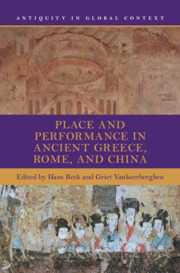Book contents
- Place and Performance in Ancient Greece, Rome, and China
- Antiquity in Global Context
- Place and Performance in Ancient Greece, Rome, and China
- Copyright page
- Contents
- Figures
- Tables
- Contributors
- Series Editors’ Preface
- Editors’ Preface
- Introduction
- Part I Crafting Space and Place
- Part II Performances of Power
- Chapter 3 Power and Its Trappings in the Han and Roman Bureaucracies
- Chapter 4 The ‘Performance’ of Agricultural Labour in Ancient Rome and Han China
- Chapter 5 Foreigners, Spectacles, and Imperial Performance
- Chapter 6 The Maiden and the Mirror
- Part III Urban Places
- Part IV Fringe Places and Endpoints
- Index
- References
Chapter 6 - The Maiden and the Mirror
Exploring Aspects of Gendered Social Performance in the Works of Plutarch and Sima Qian
from Part II - Performances of Power
Published online by Cambridge University Press: 28 November 2024
- Place and Performance in Ancient Greece, Rome, and China
- Antiquity in Global Context
- Place and Performance in Ancient Greece, Rome, and China
- Copyright page
- Contents
- Figures
- Tables
- Contributors
- Series Editors’ Preface
- Editors’ Preface
- Introduction
- Part I Crafting Space and Place
- Part II Performances of Power
- Chapter 3 Power and Its Trappings in the Han and Roman Bureaucracies
- Chapter 4 The ‘Performance’ of Agricultural Labour in Ancient Rome and Han China
- Chapter 5 Foreigners, Spectacles, and Imperial Performance
- Chapter 6 The Maiden and the Mirror
- Part III Urban Places
- Part IV Fringe Places and Endpoints
- Index
- References
Summary
This chapter explores the idea of gendered social performance through the texts of Plutarch and Sima Qian. Chandra Giroux investigates two categories of social performance in particular: friendship and authority, and death and grief. Both categories are approached from the perspective of each author’s own social performance in these scenarios as well as how they represent the social performance of women in them. Through an investigation of Plutarch’s and Sima Qian’s self-representations of their own social performances, she argues that both authors attempt to establish themselves as exemplary figures, ones that focus on the idea of the maintenance of harmony. In this way, Plutarch’s and Sima Qian’s actions are meant as a mirror for their readers’ own lives. In comparison, the chapter analyzes the examples of Timokleia and Timoxena in Plutarch’s corpus, as well as that of Nie Ying in Sima Qian’s work, to explore the authors’ notions of the ideal female reaction to friendship and authority, as well as that of death and grief. In this analysis, Giroux finds that both authors’ representations of women are based in the gender expectations of their respective societies. It is thus the differences between their cultures’ approaches to gender relations that dictate how Plutarch and Sima Qian understood the ideal female reaction to death, grief, friendship, and authority.
- Type
- Chapter
- Information
- Place and Performance in Ancient Greece, Rome, and China , pp. 197 - 238Publisher: Cambridge University PressPrint publication year: 2024

